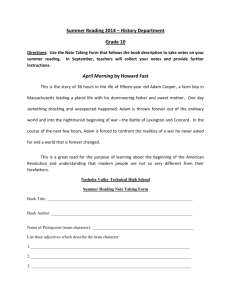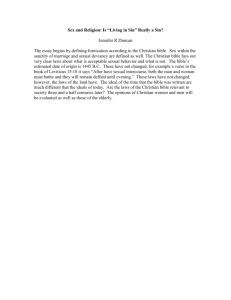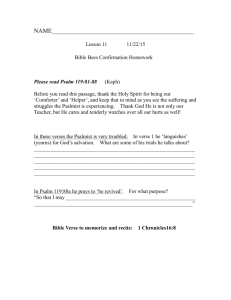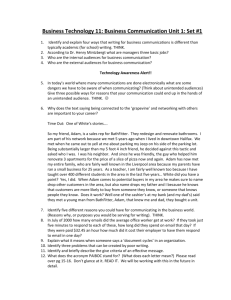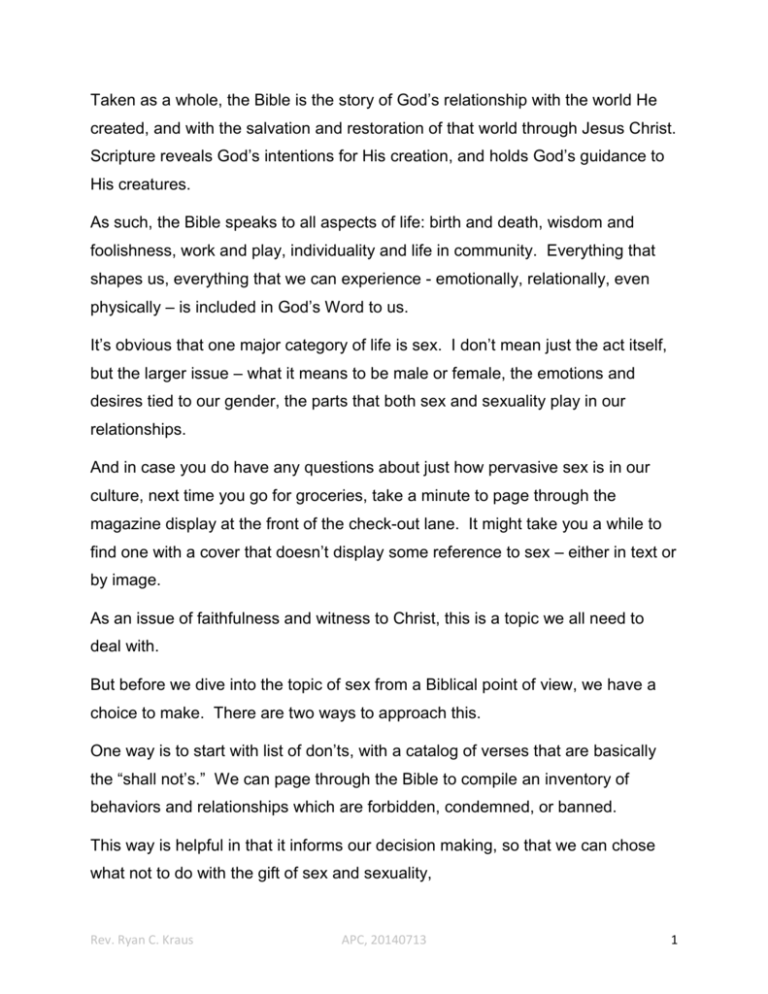
Taken as a whole, the Bible is the story of God’s relationship with the world He
created, and with the salvation and restoration of that world through Jesus Christ.
Scripture reveals God’s intentions for His creation, and holds God’s guidance to
His creatures.
As such, the Bible speaks to all aspects of life: birth and death, wisdom and
foolishness, work and play, individuality and life in community. Everything that
shapes us, everything that we can experience - emotionally, relationally, even
physically – is included in God’s Word to us.
It’s obvious that one major category of life is sex. I don’t mean just the act itself,
but the larger issue – what it means to be male or female, the emotions and
desires tied to our gender, the parts that both sex and sexuality play in our
relationships.
And in case you do have any questions about just how pervasive sex is in our
culture, next time you go for groceries, take a minute to page through the
magazine display at the front of the check-out lane. It might take you a while to
find one with a cover that doesn’t display some reference to sex – either in text or
by image.
As an issue of faithfulness and witness to Christ, this is a topic we all need to
deal with.
But before we dive into the topic of sex from a Biblical point of view, we have a
choice to make. There are two ways to approach this.
One way is to start with list of don’ts, with a catalog of verses that are basically
the “shall not’s.” We can page through the Bible to compile an inventory of
behaviors and relationships which are forbidden, condemned, or banned.
This way is helpful in that it informs our decision making, so that we can chose
what not to do with the gift of sex and sexuality,
Rev. Ryan C. Kraus
APC, 20140713
1
With the gift. God’s intentions for sex helps us live in accordance with what God
has declared to be right and good use of our sexual nature. 1
Where this approach is lacking however, is that it focuses exclusively on our
actions – it doesn’t give us a reason or explanation for why what’s wrong is
wrong, or more importantly, why what’s right is right.
The other approach to this topic, one which will guide this, and next week’s
sermon, is to start at the beginning, to first put a foundation in the ground upon
which we can build a solid Christian sexual ethic. This way, when we’re faced
with some decision, or when someone asks us why we chose to live the way we
do, we will understand both God’s original intention for creating us as sexual
creatures, male and female, and why God’s plan for sex not only benefits us, it
glorifies our Creator as well.
I invite you to turn to the first of today’s readings, Genesis 1:26-28, 31
SLIDE 1 & 2
26 Then God said, “Let us make mankind in our image, in our likeness, so
that they may rule over the fish in the sea and the birds in the sky, over the
livestock and all the wild animals, and over all the creatures that move
along the ground. 27 So God created mankind in his own image, in the
image of God he created them; male and female he created them.
28
God blessed them and said to them, “Be fruitful and increase in number;
fill the earth and subdue it. Rule over the fish in the sea and the birds in the
sky and over every living creature that moves on the ground.”
1
Schmidt, Thomas. Straight and Narrow. p 39 “…a biblical view of sexuality does not depend on lists of prohibited
activities, but on the pervasiveness and reasonableness of an affirmed activity: heterosexual marriage. [Look to
Genesis]…in this chapter of the Bible, reason and tradition combine to tell us what is good, and how to understand
departures from that good.”
Rev. Ryan C. Kraus
APC, 20140713
2
31
God saw all that he had made, and it was very good. And there was
evening, and there was morning—the sixth day.
In the first account of creation, Genesis 1:1-2:3, man and woman arrive late on
the scene. It is only after speaking into existence light and dark, heaven and
earth, land and sea, plants, sun, moon, and stars, fish and birds and all the other
critters that crawl – that God then decides to make mankind, in Hebrew – ‘adam’.
‘adam’ is more than the word that serves as the basis for the proper name
‘Adam’, for when used in this way, is generally translated as ‘human’ or ‘mankind’
in the collective sense.
In Verse 26 God speaks about ‘adam’ in the plural – as God bestows on “them”
authority and charge over the other creatures. Sense here is that God is talking
about our species as a whole.
In verse 27, the most important aspect of ‘adam’ comes to light, where we are
told that ‘adam’ reflects the very image of God – mankind is modeled, molded, a
replication of God’s attributes and qualities, which God creates in not just one,
but two distinct forms – the male and the female.
In verse 28 God blesses male and female together, and his command to them
indicates that God has provided everything necessary for them to fulfill God’s
plan. Bearing God’s image on earth in distinct, complimentary ways, this verse
indicates that, “Woman and man both come from the hand of the Creator, and
are thus of equal stature and equal dignity.”2
Together as male and female, man and woman, creation is complete, and it is
good. All God’s work being done, this first account of creation ends with God’s
rest on the seventh day.
2
Gerstenberger & Schrage. Woman & Man. p 118.
Rev. Ryan C. Kraus
APC, 20140713
3
From the very beginning, we can see that sex is good. Our maleness and
femaleness cannot be separated from our being. There is no neutral ground in
regard to our sexuality. Sexual creatures is how God made us, and that is how
God desires us to live and reproduce, in accordance with his commands.
As we establish the foundation of our sexual ethic, the next critical passage
quickly follows, the second account of the creation of humankind, beginning with
Genesis 2:4.
In this text, God forms a man before the creation of plants and animals. The
Hebrew form of ‘adam’ that appears here is singular, “the man,” ‘ha-adam’. Here
we are given more detail on how God went about his work – God takes the dust
of the ground – in Hebrew the word for ground is ‘adamah’ – and from it he forms
the ‘adam.’
And so, if anyone ever calls you a dirt-bag, respond by complimenting them on
their astute Biblical scholarship!
God breathes into the man the breath of life. Then God plants a garden, in Eden,
and, with instructions as to what is good to eat, and what is forbidden, He places
the man into it.
This is where we start our next reading, Genesis 2:18-25.
SLIDE 3 & 4
18
The LORD God said, “It is not good for the man to be alone. I will make a
helper suitable for him.”
19
Now the LORD God had formed out of the ground all the wild animals and
all the birds in the sky. He brought them to the man to see what he would
name them; and whatever the man called each living creature, that was its
Rev. Ryan C. Kraus
APC, 20140713
4
name. 20 So the man gave names to all the livestock, the birds in the sky
and all the wild animals.
But for Adam [Heb., “adam”] no suitable helper was found. 21 So the LORD
God caused the man to fall into a deep sleep; and while he was sleeping,
he took one of the man’s ribs and then closed up the place with flesh.
22
Then the LORD God made a woman from the rib he had taken out of the
man, and he brought her to the man.
23
The man said, “This is now bone of my bones and flesh of my flesh; she
shall be called ‘woman,’ for she was taken out of man.”
24
That is why a man leaves his father and mother and is united to his wife,
and they become one flesh.
25
Adam and his wife were both naked, and
they felt no shame.
In this account of mankind, Verse 18 is key to understanding why the malefemale bond represents God’s clear intention for human relationships. For in
verse 18, for the first time since the beginning, things aren’t good.
The man is by himself. And he needs help.
I see all the women in the room nodding in agreement. You know he does.
We watch God’s plan of action unfold. Looking for the perfect companion, God
forms all the animals and birds. God introduces the man to them, God lets the
man give them their names – but not one of them can fill that role.
Finally, from the very flesh of the man, God forms the woman. In his own words
we hear the man exclaim, “Whoa! Now take a look at her!” Clearly, she is a
perfect match.
Rev. Ryan C. Kraus
APC, 20140713
5
Verse 24 serves as God’s model for how this matching will occur in the
generations that follow, man and woman coming together.
By God’s design, man and woman join together as one flesh, because that is
where they began. From this verse on, new vocabulary begins to appear, words
to signify this special union – union both physical and spiritual - between a man
and a woman – that of husband and wife.
Take note of how they are described.
Fully naked, fully exposed, fully vulnerable, fully known by each other, the man
and his wife share everything. There is nothing to deny, nothing to hide from the
other, nothing of which they are ashamed.
That, my friends, is what sexy looks like. Sex as God intended.
God has made man and woman for himself, to replicate his image. God has
made man and woman for each other, two parts fitting together perfectly to form
a unified whole.
This is what sex is for, what sex is a part of. Part of God’s design, and God’s
desire, for the union of those who, from among the whole of creation, are most
like himself.
These two passages form the foundation of our sexual ethic – one, that our
sexual nature comes from God, and therefore deserves the kind of honor and
respect due to every divine gift. Second, God designed our sexual nature and
needs to be fulfilled within the union of husband and wife.
Sex is for reproduction, but it is more than that. Sex feels good, but it is about
more than the experience of pleasure. Sex is a powerful, integral part of who we
are on every level of our being.
Rev. Ryan C. Kraus
APC, 20140713
6
Knowing that we were created as male and female, to be united as husband and
wife, the next step in our sexual ethic involves the Bible’s description of man and
woman “knowing” one another – the Bible’s euphemism for reproduction.
In Genesis 4:1 we read, “Adam made love to his wife Eve, and she became
pregnant and gave birth to Cain. She said, “With the help of the Lord I have
brought forth a man.”
SLIDE 5
If you compare the NIV with other versions, what jumps out at you is how many
different ways the phrase “made love” gets treated. Let’s do that now. First, the
Good News Translation.
CLICK
Then Adam had intercourse with his wife, and she became pregnant. She bore
a son and said, “By the Lord's help I have gotten a son.” So she named him Cain.
Now, the New American Standard Version.
CLICK
Now the man had relations with his wife Eve, and she conceived and gave birth
to Cain, and she said, “I have gotten a manchild with the help of the Lord.”
Finally, the good old King James.
CLICK
And Adam knew Eve his wife; and she conceived, and bare Cain and said, I
have gotten a man from the LORD.
Rev. Ryan C. Kraus
APC, 20140713
7
I don’t know about you, but I have always felt there’s a lot of space between two
people making love, and two people knowing each other. I know our mailman,…
but that’s where it stops.
What does it mean that this one Hebrew verb gets translated in such a broad
way? What’s the real meaning?
Obviously, to “know” your spouse in the biblical sense means a lot more than
remembering her birthday. There is a deeply relational aspect to knowing. So, in
the context of marriage, this kind of ‘knowing’ means ‘making babies.’
This reflects the intimate nature of all “knowing” in the bible. It doesn’t have to be
sexual. Lots of “knowing” in the bible isn’t sexual. But it is relational. The bible’s
idea of knowing is not just a cerebral excercise. [Neither is sex just physical.]
Perhaps it’s the effects of the Enlightenment, but we tend to consider knowledge
as a matter of accumulating information. Someone who “knows” is simply a
person who’s had buckets of data poured into their head.
We think of knowledge quite impersonally. Not so in the bible. In the bible,
knowing involves relationship and heart-commitments.
So Adam and Eve were tempted to “know” good and evil (Genesis 3:5). This
was more than an addition of information. It was a taking of good and evil to
themselves to possess those terms.
Or in Amos chapter 3, the LORD is speaking to Israel and says “You only have I
known of all the families of the earth.” Does the Almighty mean that He’s
Rev. Ryan C. Kraus
APC, 20140713
8
unaware of other nations? Of course not. But He knows Israel. He is in deep
fellowship with His special people. 3
Here in Genesis, God describes sex with the same word used in other passages
to describe head knowledge and heart knowledge, facts and emotional intimacy.
They are all tied together.
Knowing this gives us a reason to resist a culture that treats sex and sexuality
like any other commodity, an object or a product we can trade or deal in as we
please – for profit, for pleasure, for excitement, for acceptance. The fact is, sex
cannot be singled out as a purely biological function or chemical reaction. Our
sexuality is an inseparable part of our body, heart and mind and soul.
Trying to single out sex, for its own sake, apart from its proper, God-sanctioned
relationship, is both dangerous, and damaging.
That being said, we all know that preserving the sanctity of sex, or reclaiming it,
isn’t easy. Human beings have been messing up God’s good gift of sex for a
long, long time.
In Gen. 3:7, when Adam and Eve defy God by eating the forbidden fruit, and their
eyes are opened to evil, the very first aspect of their relationship corrupted by sin
pertains to their sexuality. Discovering themselves naked, the very first thing
they do is cover their bodies. Not just any part – not the hands that reached out
to pick the illicit fruit – they didn’t sew gloves – they made underwear!
Next week’s sermon will focus on why and how we abuse sex, and how, by
God’s grace, sex can be restored to the good, blessed gift it is meant to be.
Amen.
3
http://kingsenglish.info/2011/01/24/knowing-in-the-biblical-sense/
Rev. Ryan C. Kraus
APC, 20140713
9


